ChatGPT in HR Management: A Comprehensive Guide
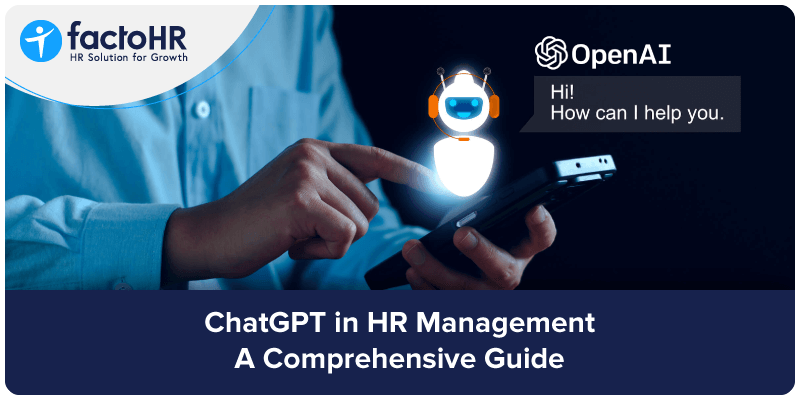
Download 50+ ChatGPT Prompts For HR PDF For Free
Table of Contents
Nowadays, AI is not just a buzzword but it has the potential to transform many industries and change the way we work. OpenAI’s latest AI system, ChatGPT, is such a technology. It is based on the GPT model and can communicate fluently in plain English. Its output is comparable to those of an average human. This blog explores how you can leverage ChatGPT in HR management and day-to-day along with improve effectiveness of recruitment, employee engagement, and training processes. We will also examine the Uses and limitations of ChatGPT in HR and its impact on the industry.
What is ChatGPT?
ChatGPT is an AI chatbot created by OpenAI, it is built on top of OpenAI’s GPT-3.5 and GPT-4 families of large language models (LLMs). ChatGPT has been trained by Reinforcement Learning from Human Feedback (RLHF) to enhance its performance and make it more capable of generating human-like responses.
ChatGPT can respond to questions and generate responses to various content, including articles, essays, emails, code, etc. It can also be used for other applications such as language translations, chatbot development, customer support, personalized recommendations etc. You can simply access chatgpt by visiting their website chat.openai.com and signing up for an OpenAI account.

How to Utilise ChatGPT in HR Management?
Here are some of the ways in through which ChatGPT can be useful for HR Management departments:
1. HR Process Guidance
ChatGPT can provide step-by-step guidance on a variety of HR management, including employee onboarding, performance evaluations, and benefit registration. ChatGPT can help automate processes by advising HR professionals to use tools and software to maximize their employees efficiency.
2. Employee Training and Development
ChatGPT can impart knowledge on a variety of subjects, distribute learning resources, and even run quizzes or interactive games for the employees. While it cannot give the same amount of engagement as a human teacher, it can help with self-paced training courses.
3. Document Generation
ChatGPT can help HR departments generate HR documents including HR letters, job descriptions, and interview questions. Which can be used in an online hrm software for recruitment purposes. HR experts can also interact with ChatGPT to produce correct and relevant documents by giving the essential facts and information.

ChatGPT Prompts for HR Professionals
Having good prompts is crucial when using ChatGPT in HR because they help ensure accurate responses, save time, increase efficiency, and improve the user experience. Clear and specific prompts help ChatGPT understand the task and provide relevant information, which benefits the HR department and employees interacting with ChatGPT. Here are some of the ChatGPT prompts that can be useful for HR professionals:
1. Prompt for Generating Job Description
Generate a job description for Tech recruiter having 2-3 years of experience in recruiting developers for high growth startups
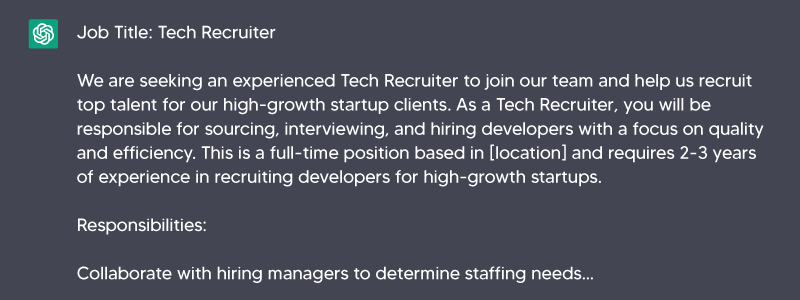
2. Prompt for Generating Checklist
Prepare an HR checklist for the employee exit clearance process
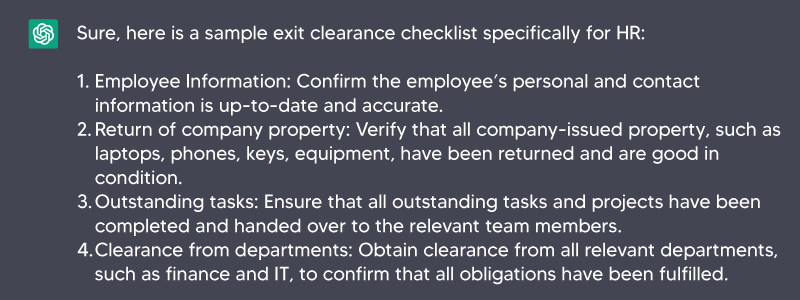
3. Prompt for Generating Interview Questions
List 20 interview questions for a candidate applying for the Content Writer job position
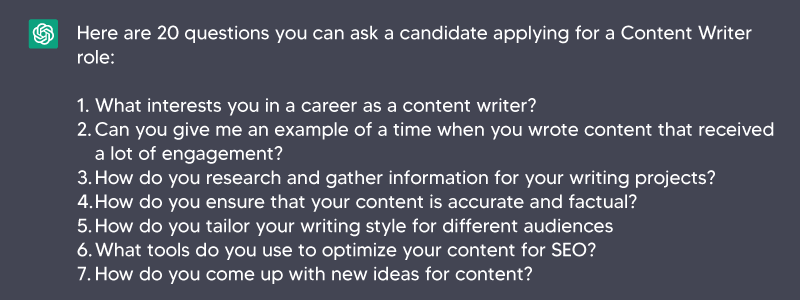
4. Prompt for Excel Formula
Write an excel formula to calculate Salary from present days and PF amount of an employee. PF amount is 12% of Salary.
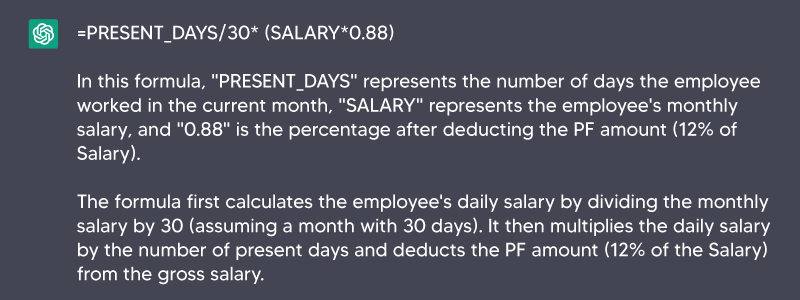
What are ChatGPT’s Limitations?
1. Limited Creativity
ChatGPT is far from replacing creativity in the near future. Although it is capable of generating text and poetry based on user prompts, it cannot generate its own ideas. Unlike AI, humans do not have a boundary to contain their thoughts and are not restricted by a 570 GB database. The human brain can store up to 2.5 petabytes, which is equivalent to 2.5 million gigabytes. The memories, emotions, and experiences that ChatGPT lacks can be a source of inspiration for fresh and innovative ideas.
2. No Mathematical Skills
Try to use ChatGPT for a complex mathematical equation, it would likely result in an incorrect answer. As a language model, ChatGPT does not possess mathematical rules and therefore cannot solve equations. This limitation extends not only to equations but also to mathematical riddles. ChatGPT can only respond to questions based on existing inputs and is unable to generate outputs on its own.
3. No Internet Access
ChatGPT is unable to provide real-time information because it does not have internet access and cannot search for information beyond the data it has been trained on. Therefore, it cannot answer questions about recent events, such as ongoing match results. This is where search engines like Google have an advantage, and it is unlikely that ChatGPT will become a substitute for Google as a search engine in the near future.
4. Lack of Interpretability
Due to its lack of interpretability, it can be difficult to determine how ChatGPT arrives at a specific answer. ChatGPT has a limited understanding of human language and may not fully comprehend the meaning behind a question or prompt. That is why, the accuracy of its response is dependent on how the question is asked. Generally, simpler and more straightforward questions tend to give better answers. It is advisable to avoid using figurative language or complex phrasing when asking questions to ChatGPT.

Conclusion
In conclusion, the use of ChatGPT in the HR department can bring numerous benefits to organizations. With ChatGPT, HR professionals can save time and focus on more strategic tasks that add value to the organization. However, it is crucial to emphasise that ChatGPT is not a replacement for human contact and knowledge. HR professionals should utilise it to supplement their skills and expertise rather than relying completely on it. As AI technology advances, we should expect to see increasingly complex and sophisticated HR uses of ChatGPT. As a result, organisations that embrace technology innovations might gain a competitive advantage in recruiting and retaining top employees.
Grow your business with factoHR today
Focus on the significant decision-making tasks, transfer all your common repetitive HR tasks to factoHR and see the things falling into their place.

© 2026 Copyright factoHR


